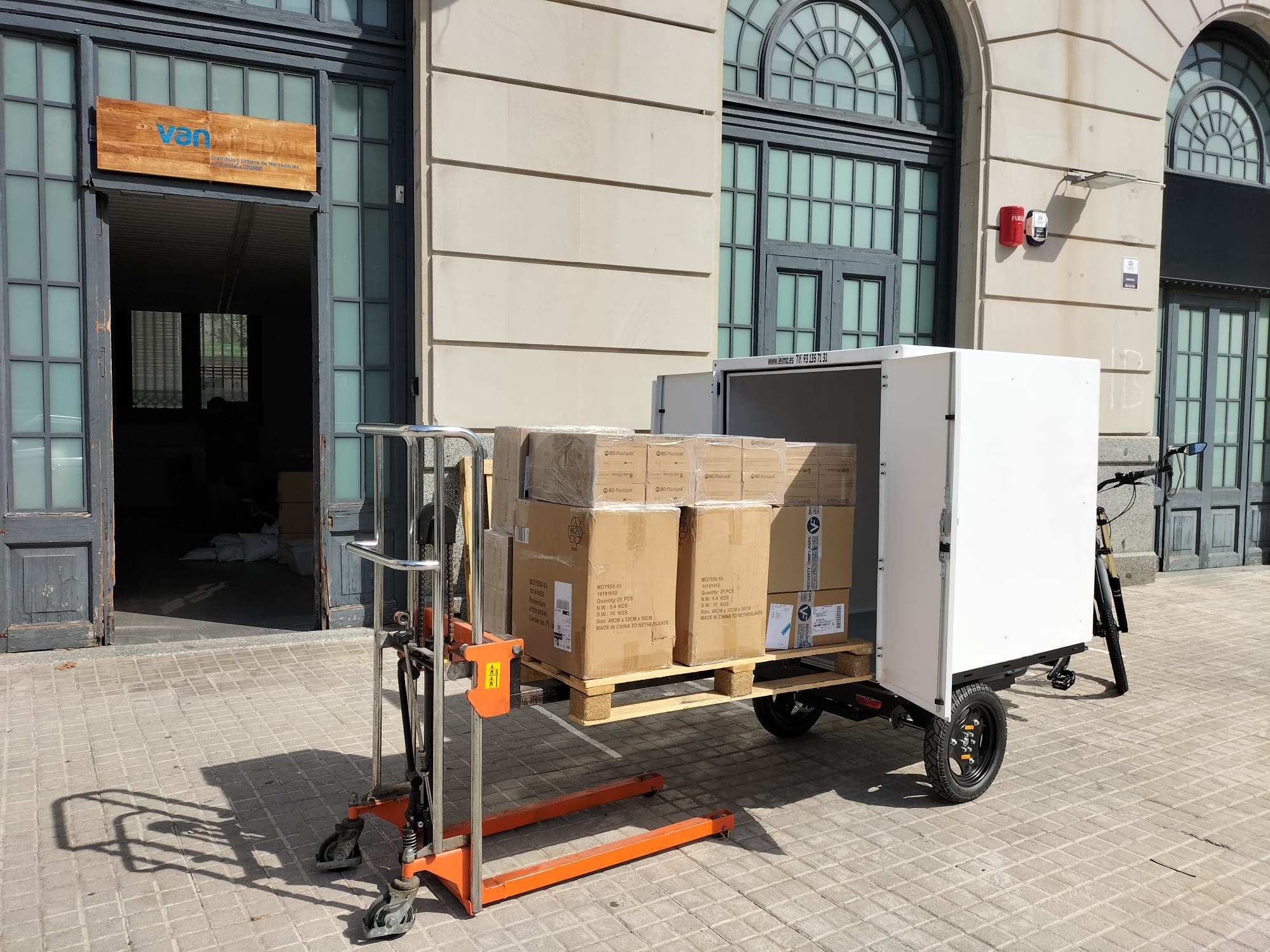Twinning Living Labs
Barcelona – Spain
Innovation focus and new services
Automated processes and vehicle innovations for advanced cycle-logistics

Context and challenges
Barcelona Metropolitan Area (AMB) registers high levels of dangerous pollution levels resulting from high volumes of urban congestion, which have increased with the new mobility patterns generated by the Covid-19 crisis. Urban logistics is a key focus in improving air quality, calling for innovative strategies to reduce the share of freight distribution made by conventional vehicles and to increase climate-friendly modes such as cargo bikes, trikes, e-bikes, or e-scooters.
URBANE will support the mobility strategy and planned investments that are included in the Barcelona Urban Mobility Metropolitan Plan (PMMU 2019-2024). Concerning urban logistics, the PMMU has defined 13 actions relating to planning (logistic areas, new rail infrastructure for freight, regulations for freight parking areas), digitalisation, and standardisation of regulations. The goals include promoting green urban freight delivery models to encourage behavioural change, as well as the development of micro-logistic platforms with sustainable delivery modes and new points to collect deliveries by citizens, contributing to solutions for reverse logistics.
Objectives and ambitions
- To optimise the management of urban freight transport.
- To reduce the environmental impacts of urban freight flows.
- To motivate citizens’ behavioural change progressively limiting home deliveries.
- To incentivise logistic companies to invest in greener vehicles.
- To develop data monitoring tools for the quantification of negative externalities and inefficiencies.
Innovations
Barcelona will implement RFID (Radio-Frequency Identification) parcel handling at the Estació de França cargo-bike hub while integrating complementary innovations resulting from the HALLO and TACTIC projects and – potentially – the URBANE Lighthouse Living Labs. The innovations to be developed are subject to ongoing discussions with 3rd party shippers (parcels and textiles sectors) and may include:
- City-wide data study on optimal hub localisation
- Improved cargo-bike box solutions
- Algorithms to facilitate the operations in the hub.
- Modelling and simulation of an open RFID solution for efficient parcel handling at a cost meeting the Last Mile Operators’ need, incorporating additional sensors or new open-source operative systems that could improve available solutions.
- Full visibility to the logistics operator as to where each package is at any given time.
- Use of RFID tags combined with GPS and blockchain technology that will provide full traceability of the delivery process, allowing customers to track their products in real time.
Partners involved
- AMB: Pilot coordinator and organiser of the cycle-logistics workshops with metropolitan cities and operators
- Open University of Catalonia UOC: Last-mile deliveries system implementation, supporting in coordination
- Vanapedal: Cycle-logistics implementation
Karlsruhe – Germany
Innovation focus and new services
Intermodal solutions combining ADVs with rail-based parcels movement
Context and challenges
Karlsruhe looks into the combined use of trams, robots, and cargo bikes for last-mile delivery. A micro-depot in combination with cargo bikes is a first milestone, but in the future autonomous robot delivery should be evaluated. As the service providers of the Courier, Express, and Parcel (CEP) Market are lacking personnel, the design of new collaborative and sharing models has become urgent.
In URBANE, an ADV (robot) will start at a specific hub and deliver parcels to the recipients in a test field residential area. The robot delivery concept will be evaluated for automatic delivery: with the robot starting at a hub, transported in a tram up to the destination station and from there making its way to the recipients – via predefined route. The goals include the design and evaluation of the new delivery method that combines tram and robot delivery, as well as a detailed feasibility study on the local infrastructure, residential areas, and trams before implementation in real-life conditions.
Objectives and ambitions
- To implement intermodal solutions combining ADVs (robot) with rail-based (TramTrains) parcels movement.
- To increase the efficiency of the logistical connection of suburban and rural areas to the city through an environmentally friendly alternative to road transport.
- To better use the existing resources in public transport to increase efficiency, quality of services, and economic efficiency, as well as to increase social participation.
- To strengthen the Karlsruhe Mobility expertise, as well as to achieve national and international transferability.
Innovations
Karlsruhe will design and evaluate a new delivery method that combines tram and robot delivery, by conducting a detailed feasibility study on the local infrastructure, residential areas, and trams before implementation in real-life conditions. Innovations developed include:
- Analysis of the conditions under which robots can replace cargo bikes in combination with TramTrains in the last mile.
- Definition of requirements for a fully automated delivery process from hub to Cityhub and further to the recipients via tram and robots.
- Real-life piloting and analysis of travellers’ acceptance for tram-robot-delivery model.
- Identification of the hardware and the software required for fully functional operation for a tram-robot-delivery.
- Standardisation of the container systems transported by the robots (as well as by the cargo bikes and other shuttles).
Partners involved
- AENET: Coordination, conducting local surveys among retailers, travellers, residents, and citizens, development ofcontainerisation delivery and intermodal solutions combining ADVs with rail transport
- City of Karlsruhe: Defining the CityHubs, identifying the regulatory gaps for implementing a new delivery, providing access for testing and demonstrating the tram-robot delivery.
- SEW Eurodrive (EUDRIVE): Determination of the design requirements for the use of autonomous mobile robots in trams. Adaptation of an existing robot for a demonstrator.